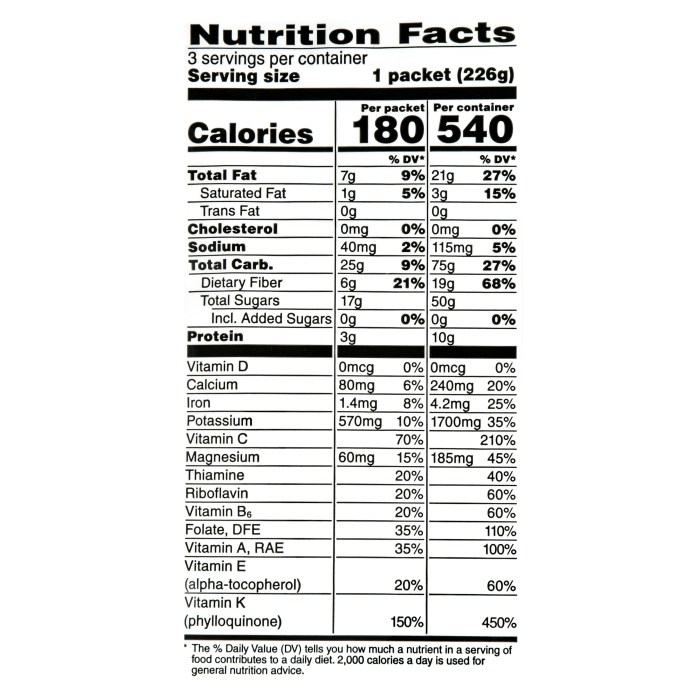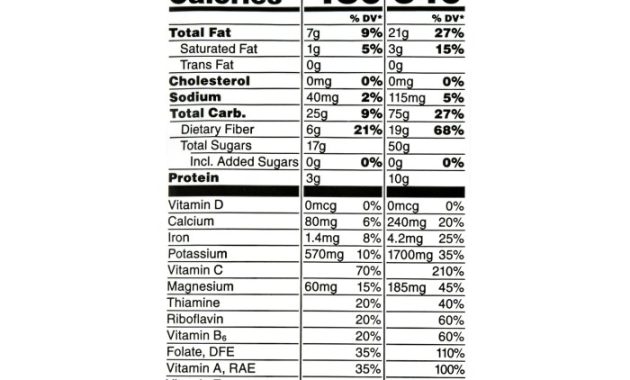Nutritional Content Overview

Tropical smoothie nutrition facts – Right, so, let’s get into the nitty-gritty of what’s actuallyin* those Tropical Smoothies, innit? We’re talking calories, carbs, protein – the whole shebang. Knowing this stuff is dead important if you’re trying to smash your fitness goals or just, like, maintain a balanced diet.
Typical Nutritional Content of a Tropical Smoothie
A typical Tropical Smoothie, depending on the flavour and add-ins, obviously, is gonna pack a fair few calories. It’s not exactly a diet drink, you know? But it can be part of a healthy lifestyle if you’re savvy about it. Here’s a general idea of what you’re looking at, but remember, these are just estimates – always check the specific nutritional info for the smoothie you’re ordering.
| Nutrient | Approximate Range | Units | What it means |
|---|---|---|---|
| Calories | 300-600 | kcal | Your energy source, mate. |
| Carbohydrates | 50-100 | g | Your body’s main fuel. |
| Protein | 10-25 | g | Keeps you feeling full and helps build muscle. |
| Fat | 5-15 | g | Essential, but too much ain’t good. |
| Fiber | 2-8 | g | Keeps your digestive system happy. |
| Sugar | 20-50 | g | Sweetness, but too much isn’t great. |
Nutritional Variations Across Different Flavors
Different Tropical Smoothie flavours are gonna have wildly different nutritional profiles. Some are gonna be higher in sugar, others in protein. Knowing this is key to choosing a smoothie that fits your needs.
Here’s a quick rundown of some common variations:
- High-Sugar Smoothies: Flavours with lots of fruit juice tend to be higher in sugar, like the Strawberry Serenity or something. Think of it like a fruit juice with some extra bits.
- Higher-Protein Smoothies: Smoothies with added protein powder or ingredients like peanut butter will pack a bigger protein punch. These are perfect if you’re hitting the gym.
- Lower-Calorie Options: Smoothies with more greens and less fruit juice will usually be lower in calories. Think of the ones with spinach or kale – not as sweet, but still tasty.
Impact of Add-Ins on Nutritional Profile
Adding things to your smoothie can massively change the nutritional content. A protein boost? Loads more protein, obvs. Extra fruit? More sugar and vitamins.
It’s all about making informed choices, bruv.
For example, adding a scoop of protein powder could easily bump up the protein content by 20-30g, while adding a handful of berries might increase the antioxidant content but also the sugar level a bit.
Understanding the nutritional content of your favorite drinks is key to maintaining a balanced diet. Tropical smoothie nutrition facts often highlight the high fruit content and potential for added sugars, a contrast to the often higher fat and calorie counts found in other options. For instance, comparing this to the information readily available on in n out nutrition facts provides a clear perspective on differing dietary choices.
Ultimately, mindful consumption of both tropical smoothies and other fast food options contributes to overall health awareness.
Ingredient Analysis

Right, so let’s get down to the nitty-gritty of what’s actuallyin* those tropical smoothies, innit? We’re gonna break down the main players, their nutritional vibes, and how they stack up against other drinks. Think of it as a proper ingredient MOT (Ministry of Taste).
Primary Ingredients and Nutritional Contributions
Tropical smoothies, generally speaking, are a right mix of fruity goodness, usually featuring a base of fruit like mango, pineapple, banana, and berries. These fruits are packed with vitamins (like vitamin C, a proper immunity booster), minerals (potassium for that heart health, you know), and antioxidants – those little guys that fight off those pesky free radicals. Then you often get a creamy element, maybe yoghurt or coconut milk, adding protein and healthy fats.
Some recipes chuck in spinach or kale for a sneaky greens boost, adding iron and other essential vitamins. Basically, it’s a bit of a nutritional party in a cup.
Health Benefits and Drawbacks of Major Ingredients, Tropical smoothie nutrition facts
Let’s be real, nothing’s perfect, even a banging smoothie. While the fruits are top-notch for vitamins and antioxidants, some tropical fruits are higher in natural sugars than others. Too much sugar isn’t great, so moderation is key, fam. Yoghurt brings the protein, which is mega for muscle growth and keeping you full, but the sugar content can vary depending on the brand.
Coconut milk adds healthy fats, but it’s also higher in calories than some other options. Spinach and kale are absolute legends for nutrients, but they can sometimes give a slightly bitter taste if you’re not a fan of greens. Basically, it’s all about balance, innit?
Nutritional Comparison with Similar Beverages
| Beverage | Sugar Content (g per serving) | Vitamin C (mg per serving) | Protein (g per serving) | Calories (kcal per serving) |
|---|---|---|---|---|
| Tropical Smoothie (example) | 25 | 50 | 5 | 250 |
| Orange Juice (1 glass) | 20 | 70 | 1 | 120 |
| Milkshake (example) | 35 | 1 | 5 | 350 |
Note: These are example values and can vary greatly depending on the specific ingredients and portion sizes. Always check the nutritional information on the product label.
FAQ Summary: Tropical Smoothie Nutrition Facts
Are all tropical smoothies created equal in terms of nutrition?
No, the nutritional content varies significantly depending on the specific ingredients and add-ins used in each smoothie. Some may be higher in sugar or calories than others.
Can I make a healthier tropical smoothie at home?
Absolutely! Making your own smoothies allows you to control the ingredients, reducing added sugars and incorporating more fruits, vegetables, and healthy fats.
Are tropical smoothies suitable for weight loss?
It depends. Some smoothies can be calorie-dense. Choose lower-sugar options and be mindful of portion sizes to support weight loss goals.
Are there any potential allergens in tropical smoothies?
Yes, common allergens like nuts, dairy, and soy are frequently included in tropical smoothie recipes. Always check the ingredient list carefully if you have allergies.

